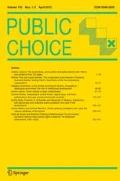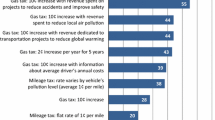Abstract
This article determines the key factors inducing INTERPOL countries to institute MIND/FIND, a technology which facilitates systematic searches of people, motor vehicles, and documents at international transit points. This integrated solution assists countries in curbing international crime and terrorism. Based on discrete-choice models, the analysis identifies income per capita, population, democratic freedoms, and anticipated searches for suspects as the key determinants of whether INTERPOL countries install MIND/FIND. Ethnic diversity, international arrivals, cost proxies, and arrests prior to adoption are not important considerations in decisions to install MIND/FIND. External financial support is an essential factor identifying likely non-adopters who installed MIND/FIND.
Similar content being viewed by others
References
Alesina, A., Devleeschauwer, A., Easterly, W., Kurlat, S., & Wacziarg, R. (2003). Fractionalization. Journal of Economic Growth, 82(2), 155–194.
Central Intelligence Agency (2010). The world factbook. https://www.cia.gov/library/publications/the-world-factbook. Accessed 9/15/2010.
Cornes, R., & Sandler, T. (1984). Easy riders, joint production, and public goods. Economic Journal, 94(3), 580–598.
Cornes, R., & Sandler, T. (1996). The theory of externalities, public goods and club goods. Cambridge: Cambridge University Press.
Crystal, D. (Ed.) (2005). The Penguin factfinder. London: Penguin Books.
Europa World Plus (2010). Airports. http://www.europaworld.com. Accessed 9/15/2010.
European Parliament (2005). Schengen Information System (SIS). http://www.europarl.europa.eu/comparl/libe/elsj/zoom_in/25_en.htm. Accessed: 2/28/2011.
Freedom House (2010). Freedom in the world country ratings, 1972–2009. http://www.freedomhouse.org. Accessed 12/29/2010.
International Monetary Fund (2010). International financial statistics (CD ROM). Washington: International Monetary Fund.
INTERPOL (2009). OASIS Africa (Fact Sheet, COM/FS/2009-06/GI-06). Lyon: INTERPOL.
INTERPOL (2010a). INTERPOL annual report 2009. http://www.interpol.int/Public/ICPO/InterpolAtWork/iaw2009.pdf. Accessed: 12/12/2010.
INTERPOL (2010b). MIND/FIND providing law enforcement with instant worldwide access to Interpol databases. http://www.interpol.int/public/FindAndMind/Default.asp. Accessed 12/09/2010.
INTERPOL (2010c). Assessment of components of costs involved in the expansion of INTERPOL services beyond the NCB (Private communication made up by MIND/FIND staff at the INTERPOL General Secretariat).
Kaufmann, D., Kraay, A., & Mastruzzi, M. (2008). Governance matters VII: Aggregate and individual governance indicators, 1996–2008 (World Bank policy research working paper, June 2009). Washington: World Bank. http://www.govindicators.org/. Accessed: 6/20/2010.
Marshall, M. G., & Jaggers, K. (2009). Polity IV dataset version 2007 and Dataset users’ manual. Fairfax, VA: Center for Systemic Peace and Center for Global Policy, George Mason University. http://www.systemicpeace.org. Accessed 7/1/2009.
NationMaster.com (2010). Tourist arrivals (most recent) by country. http://www.nationmaster.com/graph/eco_tou_arr-economy-tourist-arrivals. Accessed 11/7/2010.
Parry, M. (Ed.) (2005). Chambers book of facts. Edinburgh: Chambers Harrap Publishers Ltd.
Sandler, T. (2005). Collective versus unilateral responses to terrorism. Public Choice, 124(1–2), 75–93.
Sandler, T., Arce, D. G., & Enders, W. (2011, forthcoming). An evaluation of INTERPOL cooperative-based counterterrorism linkages. Journal of Law and Economics, 54(1).
United States House of Representatives (2004). Stolen passports: a terrorist’s first class ticket (Hearing Before the Committee on International Relations, Serial No. 108–117, June 29). Washington: House of Representatives.
United States Senate Judiciary Committee (2007). Statement of Ronald K. Noble, Secretary General of INTERPOL before the Subcommittee on Terrorism, Technology, and Homeland Security. US Senate, May 2. Washington: US Senate.
Vicary, S., & Sandler, T. (2002). Weakest-link public goods: giving in-kind on transferring money. European Economic Review, 46(8), 1501–1520.
World Bank (2010). World development indicators. http://www.worldbank.org. Accessed 11/7/2010.
Author information
Authors and Affiliations
Corresponding author
Rights and permissions
About this article
Cite this article
Enders, W., Sandler, T. Who adopts MIND/FIND in INTERPOL’s fight against international crime and terrorism?. Public Choice 149, 263 (2011). https://doi.org/10.1007/s11127-011-9839-2
Received:
Accepted:
Published:
DOI: https://doi.org/10.1007/s11127-011-9839-2




